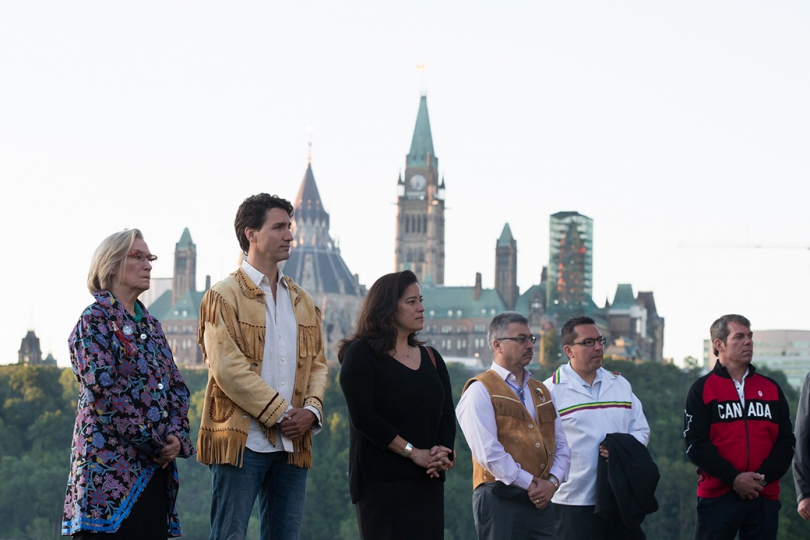Like this article? rabble is reader-supported journalism. Chip in to keep stories like these coming.
Actions speak louder than words.
Although the elected Liberal government has made some strides toward reconciliation with Canada’s First Nations, there are many structural problems that need to be addressed, particularly in the realm of criminal justice legislation.
Canada’s first Aboriginal justice minister Jody Wilson-Raybould might have shown an interest in rolling back the Harper government’s draconian crime bill legacy. However, people are still waiting for action.
The Indigenous population in federal prisons and detention centres spiked as a result of some of these laws, which includes, but is not limited to: the institution of mandatory minimum sentences, the scrapping of pardons in favour of record suspensions, and victim surcharges.
These laws, many found in the omnibus crime bill C-10, have marked individuals for life, despite how minor their offense may have been.
Jesse Thistle is a Governor General silver medalist who recently received the Trudeau Scholarship, the most prestigious doctoral award in Canada, rewarding individuals with a passion for public engagement and who are likely to become leading national and international figures.
Before he made these great strides, Thistle endured periods of homelessness due to his addictions. He committed minor property crimes to either fuel his addiction, find shelter or avoid the withdrawal process addicts often experience when detoxing from drugs and alcohol.
Thistle is using his lived experience to write the national definition of Indigenous homelessness in Canada for the “Canadian Observatory on Homelessness” to help bring a better understanding to a problem that is poorly understood by non-Indigenous Canadians.
Thistle explains how crime bills, such as C-10, not only make reintegration difficult, but also waste public funds under the illusion of creating “safe streets.”
“Bill c-10 complicates things. Right off the bat, it criminalizes addicted people for making poor life choices, marking them for life”, says Thistle.
“I know what people will say — there are real criminals who hurt people and they need to go away, which is true — but the majority of people caught in the undertow of bill c-10 are not violent criminals, they are addicts, the homeless, people from poor or underprivileged backgrounds, and so on, who commit a minor property crime and are recycled through the system in a series of escalating summary offences.”
Rather than reforming criminals by deterring them on the outset, bill c-10 brands people and creates criminals, sending them through cycles of incarceration and recidivism, he adds.
“And those who do manage to break free of the cycle of incarceration, like me, are marked for life. Getting pardons after bill c-10 is extremely difficult, if not impossible.”
“I look at reality,” says Thistle. “Politics in this instance are a backseat issue. I look at the costs of incarnation, court procedures, police, and penalization, and who ultimately carries those costs — taxpayers, not politicians. Jails and prisons cost way more than long-term treatment facilities, reintegration housing for the homeless, and education programs for the underprivileged. It’s not rocket science.”
In part of some of his campaign promises, Prime Minister Justin Trudeau stressed the importance of creating “transformational change,” but the structural deficiencies within the criminal justice system, created by the pious Conservatives, have yet to appear on their agenda in any meaningful way.
The federal budget shows billions in new spending for Aboriginal people. However, many people think this falls way short of the mark and remain skeptical, as the much of the funding is back-ended and does not start until after the next election.
And although the Liberals’ first fiscal plan has $8.4 billion earmarked over the next five years, and addresses some of the root causes of crime, a plan to sincerely look at the Harper government’s crime bill legacy remains absent.
“The Liberals have given a lot of money to Indigenous issues, but money is not the issue here, nor are empty apologies,” says Thistle.
“Canada, I believe, must grant Indigenous peoples their own lands again, invest money as well as expertise in Indigenous languages on par with investments in French, install massive amounts of infrastructure — health, education, independent tribal police and justice systems, etc.”
In First Nations, Metis, and Inuit communities, says Thistle, the Liberals need to ensure the re-establishment of Indigenous governance systems and make them thriving sovereign entities and equally split resource rights and profits with the Indigenous peoples.
Moreover, reintegration strategies for people who have been through the system remains weak at best and tragic at worst, marginalizing people, who could otherwise be contributing members of society, for life.
“I’m lucky because I was able to go back to school and use my story to educate people,” says Thistle, “but those who haven’t, have little chance of working and contributing again — they are marked for life, even if their crime was minor.”
“In essence they cannot work and will never pay taxes again and will always be a burden on the public purse as the public are left funding over-bloated corrections costs. I don’t know about you, but I’d rather have future taxpayers than massive warehouses filled with prisoners wasting Canadian dollars.”
There have been calls to address the over-representation of Indigenous peoples stuck in the system, highlighting an array of issues contributing to the high rate of Aboriginal incarceration.
Nevertheless, the elephant in the room — Harper’s wasteful and pious crime bill legacy — does not appear to be a focus of the Liberal agenda.
Like this article? rabble is reader-supported journalism. Chip in to keep stories like these coming.
Image: PMO/Adam Scotti




